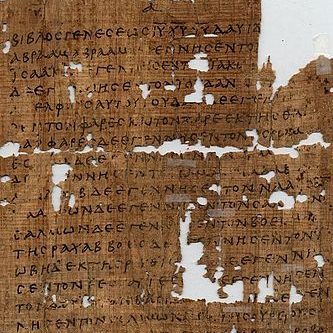Have The Gospels Been Corrupted Over Time?
Recently I heard a pastor give a message on the Story of the Adulterous Woman. In the majority of modern translations, it appears as John 8:1-11. The story tells of an incident where the Pharisees plotted to catch Jesus in a Mosaic Law trap. They brought a woman to him who had been caught in adultery. The passage contains the famous “let he who is without sin cast the first stone” verse. The story shows how far the Pharisees would go to trip up Jesus, and how Jesus forgives sin.
Here’s the thing, though; it was probably added much later and not by John.
What if I told you there are other passages that have questionable authenticity? What if I told you that there are over 40,000 textual variants to be found between all of the manuscripts we have of the New Testament? That means the different copies we have found don’t agree 40,000 times. What if I told you we don’t even have the original source manuscripts of the New Testament? Would that bother you?
Bart Ehrman is a New Testament scholar who teaches at the University of North Carolina at Chapel Hill. He has a list of academic credentials a mile long and has studied at some of the best schools. He studied under Bruce Metzger – who many hail as one of the greatest textual critics of the 20th century. He’s a multiple-time New York Times Best Selling Author and has held several debates on the historical Jesus, the New Testament, and its manuscripts. He’s also an agnostic who despises Christianity. He has shaken the foundation of thousands of Christians by his works. And, he’s probably caused thousands of students in his classes to stop trusting their Bible by talking to them about all the variants we have.
As a young Know-It-All, it was issues and challenges like this that drove a wedge between me and the Bible. Because the pastors and teachers I had never addressed these issues of variants I took it as one of two things; either they didn’t know about them, or they did and they were keeping them from us. If it was the former, it built the case for me having to put my faith on one side, and my intelligence on the other. If it was the latter, it built the case for my leaders having ulterior motives by keeping things from me. Why would they keep this stuff from us if they weren’t afraid of it?
A few years ago, before I recommitted my life to Christ, I had serious issues with how I presumed the Bible was put together. I knew men wrote it, and men made mistakes, so how could they have gotten this right? How could I base my belief system on something that was guaranteed to be full of errors?
That was before I learned about textual criticism and how it worked. Textual criticism is the discipline that reviews all of the known copies of a manuscript to determine how old they are and how authentic they are. They do this using several factors such as carbon dating, writing styles, and the language used. They also compare the contents of the various discovered copies to try and get back to what the original document said.
Let me give you a very crude example. Let’s say you are a teacher and you write your assignments for the class on the board for them to copy down. After the class is over, you erase the assignments from the board. Let’s say Bob was absent one day, and he needed to get the assignment from someone who was there. He looks at Jane’s notes and they say “Read Chapter 2 and answer questions 1, 2, 3, and 4”. Bob wanted to make sure Jane wrote it down correctly, so he looks at what Steve wrote down. Steve has “Red Chapter 2 and answer 1 2 3 and 4”. This is a really important assignment, so Bob checks with Sandi to get a third opinion. She wrote “Read 2 and do 1-4”. Even though none of the people wrote the assignment down exactly the same, is it safe to say that Bob knows what the homework assignment is? The answer is yes.
This is how textual criticism works. When the original is absent, we can examine copies of what was written by others to try and determine what the original said.
In the example above, there are quite few variants that pop up between the three examples. There are variations in spelling, variations in punctuation, and variations in word choice. Yet, it is very clear despite all of that what the assignment is. These are the same types of variants that textual critics deal with.
Now, I’d like to introduce you to Dan Wallace. He has an equally impressive list of credentials as Ehrman, and has even studied under some of the same people as Bart. He is currently a professor of New Testament Studies at Dallas Theological Seminary, and is the founder and executive director of the Center for the Study of New Testament Manuscripts. Their goal is to digitize all of the Greek manuscripts we have located thus far. He is a Christian, and became so after studying the same manuscripts that Ehrman has.
“An Embarrassment Of Riches”
40,000 may seem like a lot of variants. But, there is a good reason for that. The bigger the sample size, the more opportunity for variations in spelling, word choice, and punctuation. And do we ever have a sample size! There are over 5600 Greek manuscripts that have been discovered. In Latin, another 10,000. In other ancient languages, such as Syriac, Coptic, Georgian, Armenian, and Gothic – anywhere between 5,000 and 10,000. That’s over 20,000 manuscripts before the printing press was invented. So, yeah. there will be some scribal differences.
In comparison, people who study other ancient Greek works have the opposite problem. The next closest work in terms of manuscript copies is Homer’s Illiad with 643. After that, the writings of Sophocles at 193. How about Aristotle? 49 manuscripts. Tacitus – who we get most of our history regarding the reigns of Tiberius, Claudius, and Nero; 20. Writings of Caesar, Herodotus, Pliny, and Plato (basically the majority of ancient Greco-Roman history) – all 10 or fewer manuscripts.
If we take all of these manuscripts that we base most of what we know about the ancient world, and we combine them, the count doesn’t even come close to the number of Greek manuscripts we have for the New Testament.
As an added bonus, we have many commentaries, letters, and other various writings from the early church fathers. In these writings we can find almost every verse of the New Testament quoted, many times over. So, if the entire collection of Greek manuscripts were to burn up, we could still reproduce the New Testament without seeing the manuscripts. We would know where Jesus was born, who his parents were, that he was born of a virgin, that he proclaims to be the Son of God, that he was crucified, died, buried, and rose on the third day, that he appeared to his disciples and then ascended into heaven. It’s all there. Wirtten down outside of the original documents.
As Wallace likes to put it “truly we [Christians] have an embarrassment of riches”.
Do Variants In The New Testament Manuscripts Make A Difference?
Variants can be placed in one of two categories – meaningless or meaningful and viable. Meaningless variants do not affect the meaning of the text. These are things like spelling differences and certain word choices. For example, if one manuscript says “Jesus said” and another reads “the Lord said”, this does not affect the meaning of the passage, but it counts as a variant. The same person said it, they were just called something different. Or maybe the words are arranged in different order. In Greek, you can do that and the sentence still means the same thing. For example, “Jesus wept” and “wept Jesus” are grammatically acceptable in Greek. But, that counts as a variant.
Of the 40,000 or so variants in the manuscripts, over 99% fall into the meaningless category. This number is something both Ehrman and Wallace agree on.
The remaining 1% of variants fall into the meaningful and viable category. These are verses and passages that appear in some manuscripts but not in others. Most of these are a single word change. For example, in Revelation 13:18, it gives us the number of the beast. Tradition has told us that this number is 666. But, there are a batch of earlier manuscripts that have been discovered that give the number as 616. The meaning of the passage has changed. But, is it significant to the Christian belief system? Not really.
The passage from John 8:1-11 is another example. It’s one of the largest variants in terms of the amount of verses involved. Many early manuscripts do not possess this account at all. Some put it in Luke. Some put it at the end of John. So, its placement, and inclusion, are inconsistent. Many scholars agree that John likely did not write this passage. They say it does not match his writing style.
Based on this, they feel it was likely added later. It’s quite possible the story is true, and was just handed down as oral tradition. But, most agree that it is a later addition.
The more important question here is does it make a difference? If we take it out, does it affect our beliefs in any way? Are there things that appear in this passage that do not appear anywhere else?
Well, what do we learn from this passage? People (Pharisees, Sadducees, and others) had been trying to catch Jesus in traps regarding the law. But, they had tried this in other passages as well. (Matthew 19:3-9, Matthew 22:15-22, Matthew 22:23-33, Luke 11:53-54). This passage also teaches that adultery is a sin. Jesus talks about this in the Sermon on the Mount (Matthew 5:27-30) and many other places. We also see Jesus forgiving sin, which he also does in Matthew 9:1-6, Luke 7:36-48, and on multiple other occasions. So, as you can see, with this particular passage, none of our beliefs are in jeopardy, and we have nothing to worry about
Even though Ehrman is such a skeptic, he readily admits that the variants we have found do nothing to change core Christian beliefs. He had this to say about the variants in an interview found in the back of his book, Misquoting Jesus:
Bruce Metzger is one of the great scholars of modern times, and I dedicated the book to him because he was both my inspiration for going into textual criticism and the person who trained me in the field. I have nothing but respect and admiration for him. And even though we may disagree on important religious questions – he is a firmly committed Christian and I am not – we are in complete agreement on a number of very important historical and textual questions. If he and I were put in a room and asked to hammer out a consensus statement on what we think the original text of the New Testament probably looked like, there would be very few points of disagreement – maybe one or two dozen places out of many thousands. The position I argue for in ‘Misquoting Jesus’ does not actually stand at odds with Prof. Metzger’s position that the essential Christian beliefs are not affected by textual variants in the manuscript tradition of the New Testament.
Why Are These Passages Still There?
According to an article he wrote a number of years ago, Wallace says these passages have remained in our Bibles due to what he calls a “tradition of timidity”. We don’t want to get rid of them. At one time, a few publishers decided to remove the passages, and sales dropped. Once the passages were put back in, everything returned to normal. Most Christians are just used to them being present, so they’ve become part of our lexicon. Thankfully, most modern translations will block out major passages that do not always appear to bring attention to the reader. So, it’s not as if they are hiding the ball on us.
Know Your Sources!
Whenever you read something that makes truth claims, you should want to know its sources. On what basis do the claims stand? How can we come to know that this claim is true? The Bible is no different. Christians believe that the Bible is the revealed word of God, and, as such, we need to understand how it came to us. We need to be committed to getting the most accurate picture of The Word no matter where it leads us. If it is revealed that some verse was not in the original manuscripts, we need to be ready to get rid of it or make sure everyone who studies the Bible knows it. We are committed to knowing God personally, so we need to make sure we have the most accurate picture of His revelation to us to do that.
Also, it is up to church leaders and more mature Christians to make sure other believers understand some of the issues highlighted in this article. And not to be afraid of them! We especially need to prepare our youth for these kinds of challenges because they will face them once they get to college or university. Had I been told about some of these differences in my youth, I would have been prepared for the challenges I faced. This does not mean we all need to rush out and become textual critics to do so. But, it starts with understanding the challenges at hand, and then realizing they aren’t very challenging to begin with.
Share This Story, Choose Your Platform!
latest video
news via inbox
Subscribe and never miss an update!








Well done, Dave! So many people listen to the talking heads who criticize the Scriptures, but they never research the talking heads’ pontificating statements. The Bible can stand up to any criticism, because God inspired its words and led its authors.
The article highlights the importance of textual criticism in understanding the Bible, emphasizing that while variants exist, core beliefs remain unchanged. It encourages transparent, informed faith rooted in scholarly inquiry.